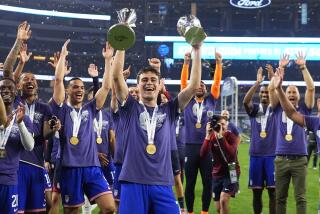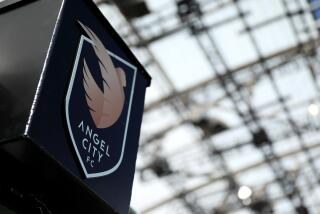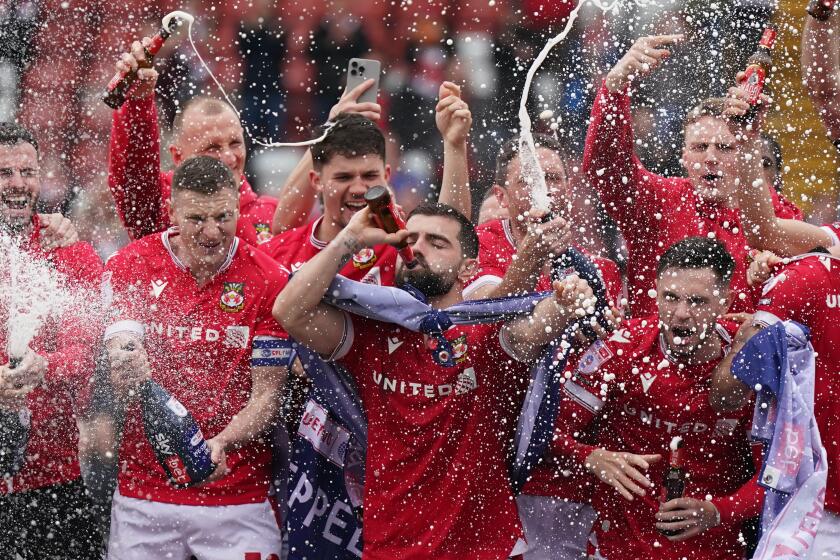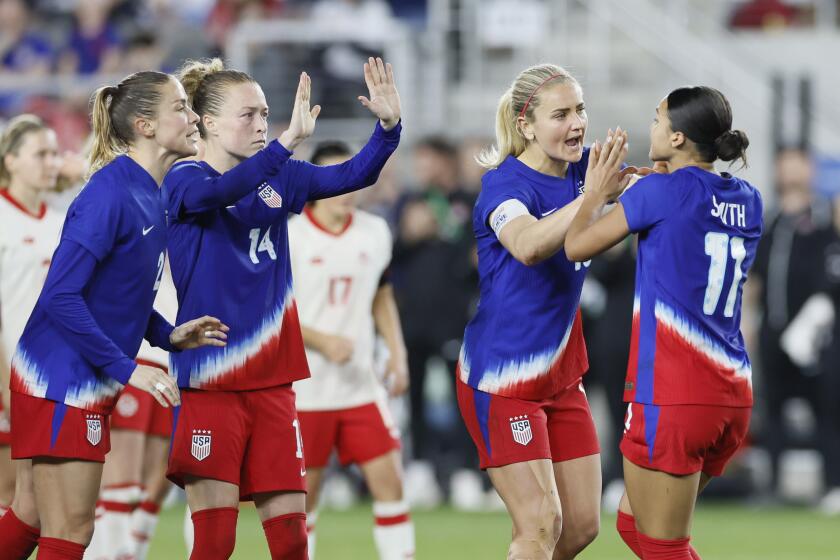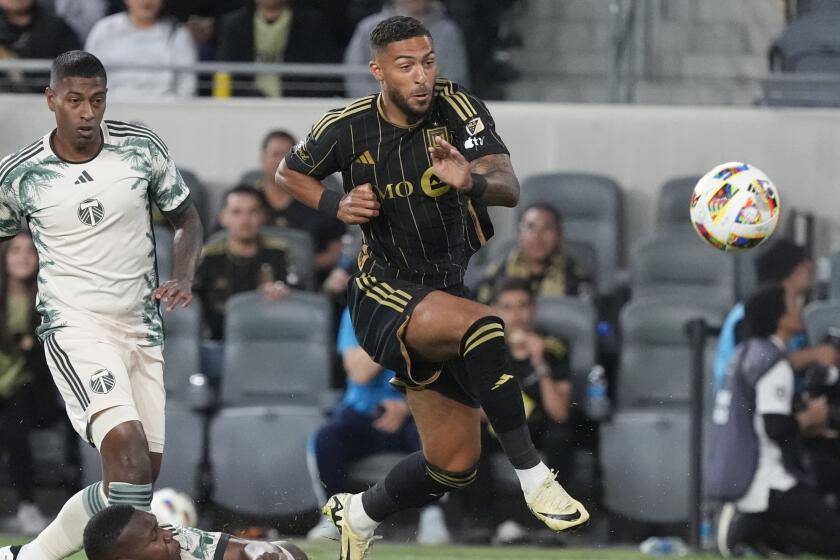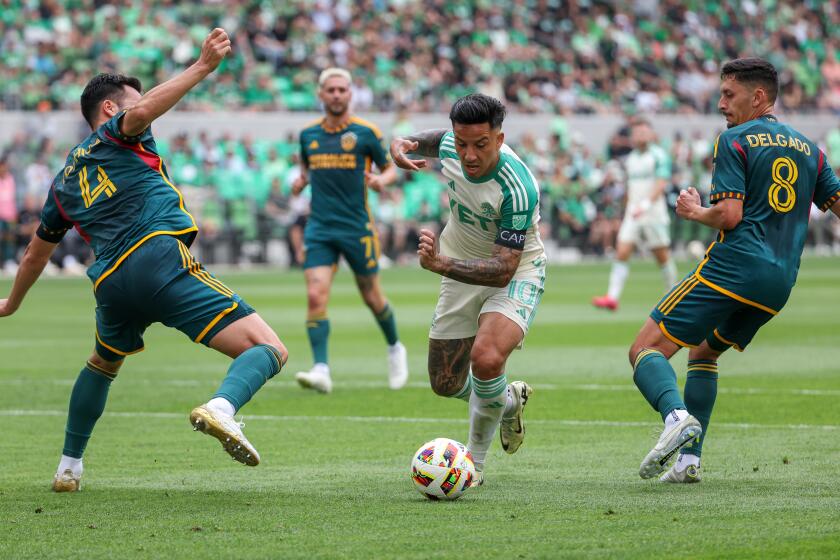It Comes Full Circle for Arena
On a bright summer afternoon 15 years ago, Bruce Arena sat in the stands at the Stadio Comunale in Florence, Italy, and watched as the United States got thumped, 5-1, by Czechoslovakia in the team’s opening game of the Italy ’90 World Cup.
Arena was only 38 at the time and his appointment as coach of the U.S. national soccer team still lay eight years in the future.
“I went to Italy as a supporter of the U.S. team,” Arena said Friday by telephone from Leipzig, Germany. “Two of my players from the University of Virginia, Tony Meola and John Harkes, were playing in the World Cup.
“So I went as a fan. I brought my wife and son. It was a fantastic opportunity. I just sat in the stands with everybody else and enjoyed it. I saw all three U.S. games and a couple of other games.”
Stunned by the Czech debacle, Arena traveled south to Rome, where he watched the U.S. play much better but still lose, 1-0, to Italy at the Olympic Stadium.
Finally, there was a 2-1 defeat to Austria back in Florence that ended the first U.S. World Cup adventure in 40 years.
Next summer, the Americans again open a World Cup against the Czechs (now minus the Slovaks) and again play the Italians in their second match.
History might repeat itself, but Arena hopes not. The U.S. team that he takes to Germany in 2006 will be a far cry from the squad that accompanied then-coach Bob Gansler to Italy in 1990.
An essentially wet-behind-the ears college outfit has been replaced by a seasoned professional team, one that will respect but not fear its opponents.
“That will be an interesting side story to this competition,” Arena said.
“I was in Italy in 1990 and I can promise you that we were not at all competitive with these countries. It’ll be interesting to see this time around how much progress we’ve made.
“My sense is we’ve made a lot of progress.
“It will be fun for me personally to see, because I sat in the stands in Italy and shook my head. Not to disrespect the performance of our players, but it was so obvious to me at that point in time that we had a long way to go.
“Fifteen years later we get to replay these matches. It’ll be interesting to see where we are.”
The U.S. has six months in which to prepare a team that can match wits and skills with the likes of Czech midfielder Pavel Nedved, Italian defender Alessandro Nesta and Ghanaian playmaker Michael Essien.
From the moment Friday when the U.S. learned who its three first-round opponents at the Germany ’06 World Cup would be, Arena started to shift the focus.
No matter how formidable a challenge the Czech Republic, Italy and Ghana presents, the Americans’ chances of advancing in the 32-nation quadrennial world championship depend entirely on the U.S. players and coaches themselves.
The U.S. will play at least 10 and possibly more games ahead of the World Cup, but Arena said he would not be seeking teams that mirror his World Cup opponents.
“That is generally a wasted exercise,” he said.
“The most important thing between now and June 12 [the date of the U.S. opener against the Czech Republic in Gelsenkirchen, Germany] is that we have a healthy team, a good roster and are playing well and are in good form.
“And then on June 12 we’ll show up and present problems to our opponent as well as they will to us.”
The U.S. pre-World Cup schedule calls for it to play two matches in January, two in February, two in March, one in April and three in May. Only the first three opponents -- Canada, Norway and Japan -- and one of March’s opponents -- Germany on the road -- have so far been announced.
Arena has a six-week training camp opening at the Home Depot Center on Jan 4.
“I don’t know what lies ahead for our team in terms of the fitness of some players and everything else,” he said, “but we just simply are going to concentrate on getting our team as strong as we possibly can so that we step on the field June 12 with the confidence that we can beat the Czech Republic.
“And if we do that, there are a number of problems we can present to any team in this group.”
Reaching the quarterfinals at the Korea/Japan ’02 World Cup has left the U.S. with a solid group of veterans who know what can be achieved. At least one third of the 23 players on the U.S. roster in 2006 will have one or more World Cups under their belts.
“I think that’s important because if you ever pay any attention to the so-called experts of the press in trying to predict which group is strong and which group isn’t and who the favorites are and who aren’t, it’s a futile exercise,” Arena said.
“Our experience in the last World Cup told us simply that if we prepare our team and we’re ready to play we can compete with any team in the World Cup.
“And that’s what our preparation will be this time around. We have a lot more experience to lean on than we did in 2002.”
Arena said he would not mold his roster to counter whatever strengths and weaknesses are perceived in the Czech Republic, Italy or Ghana.
“We’re going to concentrate on making our team as strong as possible and not worry about who our opponents are,” he said. “That’s going to be the criteria in selecting our roster.”
The U.S. roster is expected to be announced in April, well ahead of FIFA’s May deadline.
The U.S. went 1-1-1 in the first round in 1994 and again in 2002 and in both cases it advanced.
A similar effort will be required in Germany. The victory could come against Ghana in the third match, but before that at least a tie will be required against the Czech Republic or Italy.
Traditionally, the American team has not fared well against European opponents, especially in Europe. Arena discounted that, however.
“We have a team that’s four years older than the one in 2002,” he said.
“We have a number of players who have experience not only in a World Cup but in good club competition in Europe. I don’t think it’s an issue.
“Beating a European team is definitely something we’re capable of doing.”
